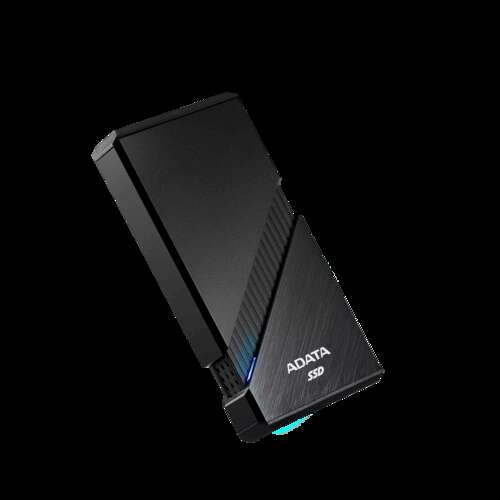Forward-looking: The USB4 standard launched a few years ago, and USB4 2.0 has been taking shape for a while, but devices supporting the protocol remain scarce. Adata is the first to launch an external SSD that incorporates USB4 1.0. The new model enables dramatically increased performance compared to the competition.
Adata advertises sequential read speeds of up to 3.8GB/s and write speeds reaching 3.7GB/s with its new SE920 portable SSD. When connected to devices that can saturate its USB4 bandwidth, that performance could almost double the Elite SE880 the company introduced last year and nearly quadruple leading models like Samsung’s T7 Shield.
Unsurprisingly, the SE920 is backward compatible with USB 3.2 and 2.0, but its USB-C USB4 connection also allows cross-compatibility with Thunderbolt 4. Sequential write speeds through Intel’s related transfer protocol can reach 3.2GB/s. The SSD comes in 1 and 2TB models.

Another unique feature is the drive’s spring-loaded transformable shell, which controls its active cooling system. Users activate the fan, which keeps the device ten percent cooler than fanless portable SSDs, by pressing down on the case. Pressing down again retracts the shell for increased portability.
Adata hasn’t mentioned pricing or a release date for the SE920, and the SSD hasn’t appeared in online stores, but the company’s announcement indicates it should emerge soon.
Devices supporting USB4, which feature bandwidth up to 40GB/s, include recent MacBooks, iPad Pros, and some Windows notebooks. Accessories allowing users to expand USB4 support have also begun to appear.
MSI unveiled a USB4 add-in board at Computex in June, which can bring faster USB transfer speeds to desktop motherboards and charge external devices at up to 100W. In July, Plugable and Kensington revealed docks featuring USB4 ports. Aside from charging and data transfers, these add-ons can help PCs maintain high-bandwidth connections to external monitors.
Although sectors like external storage are only now seeing their first USB4 products, USB4 2.0 is approaching. Closely linked to Thunderbolt 5, the latest USB specification doubles bandwidth yet again to 80GB/s, but certain asymmetrical connections can increase the number to 120GB/s in one direction (while the other drops to 40GB/s). The USB Promotor Group released the final USB4 2.0 specifications late last year, so hardware supporting those speeds could begin appearing soon.

